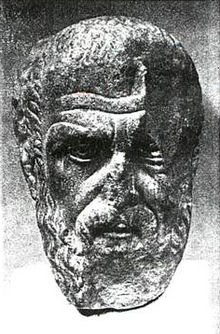Arrian
Arrian was a Greek who served the Roman Emperor Hadrian as a governor and (perhaps) as a general; after he retired, he specialised in writing military histories.
Arrian lived four centuries after Alexander, but he did have a number of contemporary sources on which he based his history - especially the accounts of Ptolemy (one of Alexander's generals who became ruler of Egypt) and Aritobulus (a military engineer on some of Alexander's campaign -- his nickname was 'the flatterer').
Arrian regarded Alexander as 'a hero totally unlike any other human being'. The historian AB Bosworth therefore declared Arrian unreliable -- firstly, because his sources were unreliable (especially Ptolemy), and secondly because Arrian then interpreted them incorrectly. Arrian's history concentrated on what happened, with occasional moral judgements on Alexander.
1. Strengths of Arrian
* used contemporary sources
* consciously tried to select the best/most reliable sources
* attempted to gain an objective view
* had personal military experience/ experience as a military writier
* was motivated, even obsessed (said it was his whole life's work)
* had personal experience as a ruler/of government
* steeped in the Greek heritage
* wrote in his 60s (experienced and reflective)
2. Weaknesses of Arrian
* arrogant and over-confident
* writing four centuries after the events
* Bosworth says he didn't really understand ancient Greek culture and society
* only as reliable as his sources (esp Ptolemy has been shown to be very unreliable)
* he used wrong criteria to judge sources (e.g. he believed kings don't lie)
* might NOT have had military experience (no evidence of his 'campaign')
* accused of hagiography/eulogy (idolised Alexander).

Links:
The following web pages will help you complete the task:
This document contains the relevant sections of the set
OCR Textbook.
Arrian - Mr Clare's factsheet
Task
Read the following passages from Arrian, and write answers to the questions which follow:
Wherever Ptolemy, the son of Lagus, and Aristobulus, son of Aristobulus have written the same things about Alexander, son of Philip, I have followed their accounts as true in every way; but where they give different accounts, I have chosen what seems to me the more reliable account as well the more worthy of recording in my history. Other writers have given different versions of Alexanderís life, and there is no other figure who has attracted such contradictory accounts. In my opinion Ptolemy and Aristobulus are more reliable; Aristobulus was on the expedition with king Alexander, as was Ptolemy - since he later became a king himself, lying would have been more shameful for him than for any other writer. Both wrote their accounts when Alexander was already dead, so there was no necessity or expectation of reward for them to write down anything except the truth.
Suggest TWO things this passage tells us about how Arrian wrote the Anabasis. [4]
No other single
individual, either Greek or barbarian, has achieved such incredible success
on so many occasions and to such an overwhelming extent. For that reason I
have myself started writing this history, as I think Iím up to the task of
bringing Alexanderís deeds to a wider audience. Whatever my abilities as a
writer may be, I do not need to write my name here, for it is not unknown to
my contemporaries, nor is my country nor my family, nor the successes that
Iíve had in public life in my own country. But I do state this, that these
stories are and have been from my youth my country and my family and my
successes. It is for that reason that I consider myself worthy of the finest
writers in the Greek language, since my subject, Alexander, was the finest
of warriors.
Explain what this passage shows about why Arrian wrote the Anabasis. [4]
WHOEVER therefore reproaches Alexander as a
bad man, let him do so; but let him first not only bring before his mind all
his actions deserving reproach, but also gather into one view all his deeds
of every kind. Then, indeed, let him reflect who he is himself, and what
kind of fortune he has experienced; and then consider who that man was whom
he reproaches as bad, and to what a height of human success he attained,
becoming without any dispute king of both continents, and reaching every
place by his fame; while he himself who reproaches him is of smaller
account, spending his labour on petty objects, which, however, he does not
succeed in effecting, petty as they are. For my own part, I think there was
at that time no race of men, no city, nor even a single individual to whom
Alexander's name and fame had not penetrated. For this reason it seems to me
that a hero totally unlike any other human being could not have been born
without the agency of the deity... In your
opinion, how reliable is Arrianís account of Alexander?
In relating the history of
Alexander's achievements, there are some things which I have been compelled
to censure; but I am not ashamed to admire Alexander himself. Some actions I
have branded as bad, both from a regard to my own veracity, and at the same
time for the benefit of mankind. For this reason I myself undertook the task
of writing this history not without the agency of god.
You must refer
both to this passage, and to your knowledge of Arrian as a writer. [5]